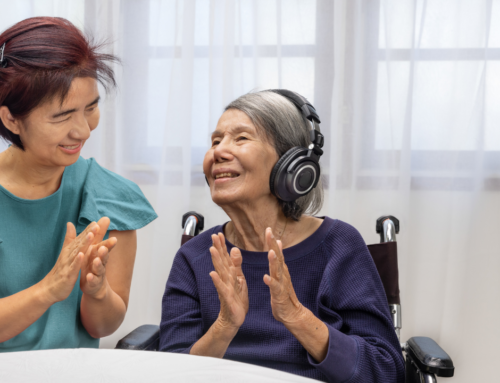Share This Story!
Music Therapy For Memory And Recall
Music from a bygone era has the power to lift spirits and promote happiness in young and older adults alike. Music is a universal language that transcends age and time. Music therapy is not a new thing. Health professionals have touted the beneficial effects of music on memory for seniors with or without memory problems for decades.
Benefits of music on memory
Music can offer numerous health benefits for everyone, especially seniors who want to improve memory retention. Music’s therapeutic potential includes benefits of memory recall, mood elevation, and mental stimulation. Music also allows seniors to interact with others. The therapy can decrease anxiety and pain with fewer drugs and uncomfortable treatments.
Learning an instrument
At any age, learning or practicing an instrument as a hobby or for a specific career helps people in numerous ways. Studies have shown that musical training can help improve language skills, brain development, and responses to sound stimuli. Learning the flute, guitar, or keyboard can do more than just get people dancing, but also improve memory.
Singing out loud
Some studies have shown that singing along to a song’s lyrics can help those recovering from a stroke or brain injury. In particular, singing is helpful for damages that have affected the left-brain area responsible for speech function. Singing ability isn’t changed, which is why patients can sing thoughts to regain speech skills. Singing can also help healthy individuals remember facts or phrases quicker.
Personalized playlists
Dementia patients may incorporate music therapy as a form of treatment. Assembling a list of songs that the patient once enjoyed can help the patient elicit a variety of reactions from pure joy to pensive introspection. Listening and performing music can reactivate certain areas in the brain associated with memory, emotion, reasoning, and reward.
A recent study used functional magnetic resonance imaging to record the brain activity of subjects after hearing music from when each subject was 8-18 years old. Strong emotions and memories were linked with high activity in the upper part of the medial prefrontal cortex, the area of the brain responsible for memory.
Staving off memory degradation
In dementia and Alzheimer’s patients, the medial upper prefrontal cortex is one of the last regions of the brain to suffer atrophy. Engaging the area associated with emotion and long-term memory can not only bring memories back, but decrease anxiety, stress, and improve heart rate and breathing. This is good news for seniors looking to live a healthier life.





